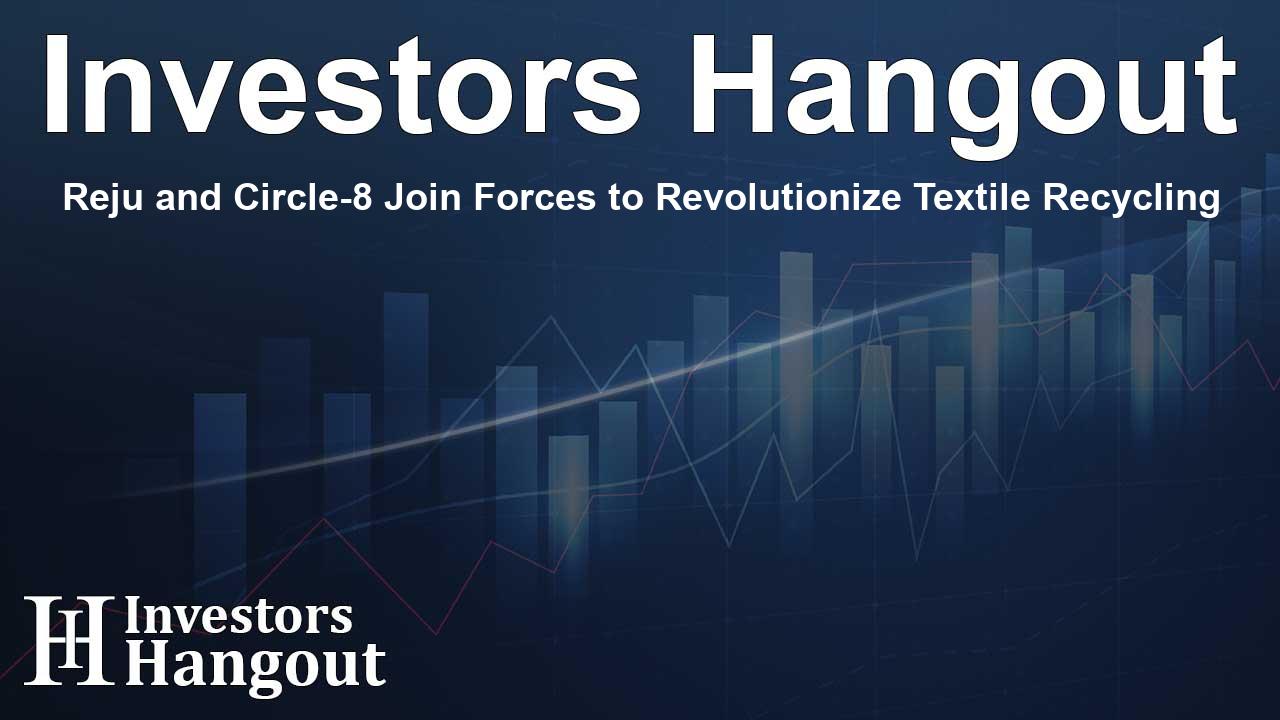Reju and Circle-8 Join Forces to Revolutionize Textile Recycling

Reju and Circle-8 Partner for Sustainable Textile Recycling
Reju™, a forward-thinking textile-to-textile regeneration company, has formed a partnership with Circle-8 Textile Ecosystems, a pioneer in creating infrastructures for textile recycling in the U.K. This collaboration aims to further the development of a circular textiles ecosystem, which is essential for environmentally sustainable practices.
Innovation in Textile Recycling Infrastructure
Circle-8 will supply Reju’s future European Regeneration Hubs with feedstock sourced from post-consumer textile waste. This waste will be processed through Circle-8's innovative Automated Textile Sorting and Preprocessing (ATSP) facility. This partnership marks a significant step towards establishing a network of industrial-scale facilities that will enable Reju to utilize this feedstock for producing regenerated Reju Polyester™. This new material boasts a 50% lower carbon footprint compared to traditional virgin polyester and has the capability to be regenerated indefinitely.
Enhanced Efficiency in Textile Processing
Patrik Frisk, CEO of Reju, expressed his excitement about the collaboration, stating, "Working with Circle-8’s advanced ecosystem and ATSP allows us to significantly improve the textile recycling process. This partnership will not only enhance efficiency but also ensure that we meet the highest standards we’ve set for our polyester products." He noted the growing awareness among consumers and clothing manufacturers regarding the necessity of reducing textile waste, emphasizing the importance of efficient, automated processes in tackling this issue.
Building Sustainable Ecosystems
The alliance between Reju and Circle-8 aims to fortify the U.K.'s infrastructure dedicated to materials processing. By collaborating with brands and retailers, they seek to foster a completely transparent fiber-to-fiber ecosystem. This plan is particularly critical given the staggering amount of approximately 700,000 tonnes of non-reusable textile waste generated annually in the U.K.
Commitment to Circular Textile Solutions
Cyndi Rhoades, co-founder and CEO at Circle-8, reaffirmed their shared commitment to advancing indefinite textile-to-textile recycling. She highlighted how crucial cooperation and innovation are in transforming textile waste into valuable resources. The ongoing efforts by global regulatory bodies to promote sustainable practices further bolster the significance of their initiatives, ensuring they can meet future regulatory demands.
About Circle-8 Textile Ecosystems
Circle-8 is dedicated to revolutionizing the textile industry by establishing an ecosystem that supports the recycling of textiles. Their mission emphasizes that the future of materials is not based on extraction but on a circular economy. They are committed to constructing automated sorting and pre-processing facilities aimed at repurposing non-reusable textiles into feedstock for fiber-to-fiber recycling processes. Their ultimate goal is to create industrial-scale polymer recycling plants in the U.K., aiming to divert a considerable amount of the annual textile waste away from landfills.
About Reju
Reju focuses on innovative solutions for regenerating polyester fabrics and PET waste. With support from Technip Energies and technology originating from IBM research, Reju is committed to establishing a global circular ecosystem for textile recycling. The company aims to address the challenges posed by PET plastic found in textiles, contributing to a more sustainable future.
Frequently Asked Questions
What is the partnership between Reju and Circle-8 about?
The partnership focuses on improving textile recycling infrastructures in the U.K., facilitating a circular textile ecosystem.
How does the Automated Textile Sorting and Preprocessing facility work?
This facility will sort and process post-consumer textile waste to provide high-quality feedstock for regeneration processes.
What environmental benefits does Reju Polyester™ offer?
Reju Polyester™ has a 50% lower carbon footprint than virgin polyester and can be regenerated infinitely, supporting sustainable practices.
How much textile waste is generated in the U.K. annually?
Approximately 700,000 tonnes of non-reusable textile waste is generated each year in the U.K.
What is the vision of Circle-8 for the future of textiles?
Circle-8 envisions a circular textiles industry where waste is minimized through efficient recycling and reuse strategies.
About The Author
Contact Evelyn Baker privately here. Or send an email with ATTN: Evelyn Baker as the subject to contact@investorshangout.com.
About Investors Hangout
Investors Hangout is a leading online stock forum for financial discussion and learning, offering a wide range of free tools and resources. It draws in traders of all levels, who exchange market knowledge, investigate trading tactics, and keep an eye on industry developments in real time. Featuring financial articles, stock message boards, quotes, charts, company profiles, and live news updates. Through cooperative learning and a wealth of informational resources, it helps users from novices creating their first portfolios to experts honing their techniques. Join Investors Hangout today: https://investorshangout.com/
The content of this article is based on factual, publicly available information and does not represent legal, financial, or investment advice. Investors Hangout does not offer financial advice, and the author is not a licensed financial advisor. Consult a qualified advisor before making any financial or investment decisions based on this article. This article should not be considered advice to purchase, sell, or hold any securities or other investments. If any of the material provided here is inaccurate, please contact us for corrections.
